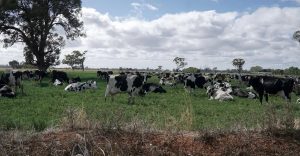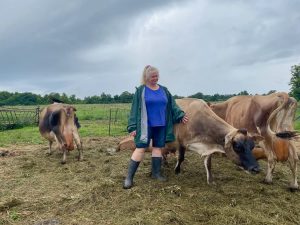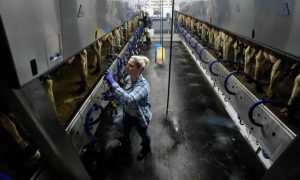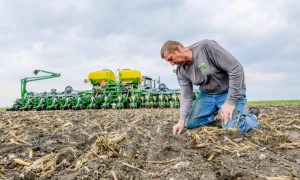
At the family’s Father’s Day lunch, one of the younger members of the family recounted how his peers often get into arguments between those who believe in global warming and those who claim it is a myth. It is striking how the real crux of the issue is so out of focus and has well-meaning people arguing senselessly.
Global warming is a reality, what is debatable is the extent to which it affects life on the planet and where it is necessary to touch so that the actions taken are worthwhile and do not turn into barren debates that do nothing more than confront us and distance us from concrete solutions.
Big campaigns postulate that abandoning meat and dairy consumption would save the planet, combat climate change, stop deforestation and the destruction of wildlife, and preserve water. None of these principles is nonsense.
“Green Mondays” was a proposal of the Ministry of Environment of the Nation (Argentina) that invited to replace animal protein with vegetable protein, and also derived in “Meatless Mondays” that was quickly withdrawn for opposing the real arguments of regenerative livestock farming, which was being promoted on the other hand.
In the meantime, the livestock producer’s activity is losing social permission, and the idea that what he produces is bad for health and that he is also the monster responsible for the destruction of the planet is growing. Very counterproductive for them and… very convenient for whom?
Bill Gates, who urges us to eliminate meat and milk from our diets, under the threat that not doing so would lead us to climate and health disaster, is one of the greatest promoters of synthetic meat, however there is ample scientific evidence that his method of production would be emitting more greenhouse gases than would an animal in a pastoral or silvo-pastoral system.
Organizations that hire celebrities, such is the case of PETA with Joaquin Phoenix, expose highly emotional messages that generate great impact. Regarding dairy production specifically, we all remember how the story of an influencer carried more weight than any scientific statement, appealing to the sensibility of a public highly permeable to this.
It is true that the emission of carbon dioxide of anthropogenic origin is increasing, but not all greenhouse gases are bad, in fact they are necessary to retain part of the heat that reaches the earth. There have always been cycles of warming followed by cycles of cooling, but the problem now is that the rate at which the planet is warming is much higher than the historical average.
¾ of the emissions come from power generation, transportation and industry. When ALL animal production accounts for 5.8% of direct emissions. This alone should be enough to begin to understand once and for all, that the problem lies elsewhere, and not in the feedlots. Even if we add deforestation, which is also a side effect of some livestock developments, we would be in the order of 7%.
Since coal mining began in 1752 and the first steam engines appeared, Argentina has emitted 0.51%, Europe 33% and the EU 25%, the rest is distributed throughout the rest of the world.
Developed countries make commitments to reduce their emissions and put pressure on less developed countries to do the same. And we have to work on reducing emissions, that is a global goal, it does not depend on where we are domiciled, but the demand cannot be the same for developing countries as for those that are already at another level of possibilities.
There is a very strong correlation between the level of emissions and the development of countries; however, the most developed countries got to where they are because they emitted without control, and today they can change their energy matrix towards cleaner but much more costly ones. The less developed countries, which are the ones that emit the least and have the least investment capacity, are imposed the same responsibility, they are asked to make a sacrifice, but the pressure should be less.
In 2006, FAO published a report called “The Long Shadow of Livestock”, in which it placed animal production at the top of the list of the world’s greenhouse gas emissions. Producing meat and milk became heresy and the media and organizations continue to use and abuse the misinformation of 16 years ago, despite the fact that in 2009 gross methodological errors were reported in that report. In 2013 FAO recalculated, and blamed livestock farming for 20% less responsibility, but there is no apology or new report to repair the damage it caused and continues to cause with its 2006 report.
How do we explain it to you? One molecule of methane warms the earth 28 times more than one molecule of carbon dioxide, and this is what all the calculations were based on. But it turns out that the methane belched out by cattle is not equivalent to that from burning fossil fuels. It is incorrect to compare the two. The methane that cows belch in their digestive process is part of a biogenic cycle and is recycled through photosynthesis. Plants transform it into cellulose, starch and other compounds that the animal consumes while grazing. In a dozen years, this methane is transformed into CO2 and is reincorporated into the cycle.
Then there is the anthropogenic carbon cycle: 100 years extracting carbon accumulated 8 km underground, its gases are not recycled, they accumulate in the atmosphere for a thousand years until they manage to degrade and that is what the planet is being unable to withstand.
This does not mean that livestock farming cannot make its contribution by improving its emissions. The change must be cultural and everyone has to contribute to the care of the planet from their own place. For this reason, the study and evolution of dairy production systems is constant.
Pastoral systems are potential carbon sequestrators, and in intensive or confined systems, where dairy cows do not go out to pasture, but are served feed, the diet is better balanced and can emit up to 30% less.
Abandoning meat and milk consumption not only puts your health and capabilities at risk, but also does not provide a solution. It’s not that way. It is not by decreasing the quality of human nutrition that the planet will be saved. Consumers are increasingly attentive to alternatives that prioritize environmental care, but they cannot leave health by the wayside.
Legitimate milk is not harming the environment. Its production occupies land, space, water: nothing can be produced without resources. It is a delusion to pretend to live off the air, the sun and things that pretend to be what they are not.
Can these resources be used more efficiently? Of course we can always rethink the ways of doing things. Science and technology at the service of agriculture and livestock farming are working every day towards this goal, in order to produce more and better food to feed a growing population.
It is perverse to try to convince us that our existence is detrimental to everything around us. I do not agree with that guilty look of the human being who must degrade himself in favor of the environment or whatever, I believe that we are as wonderfully part of this planet as the earth, the animals, the plants, the water and the air. I believe that as thinking, creative and creative beings we must use resources responsibly. It is true that it is an awareness that we did not always have, but that we are generating in learning from trial and error.
I continued to choose the best nutrition. Eating meat and consuming dairy products is good for you.
Have you had your glass of milk today?
Valeria Guzmán Hamann
EDAIRYNEWS
























